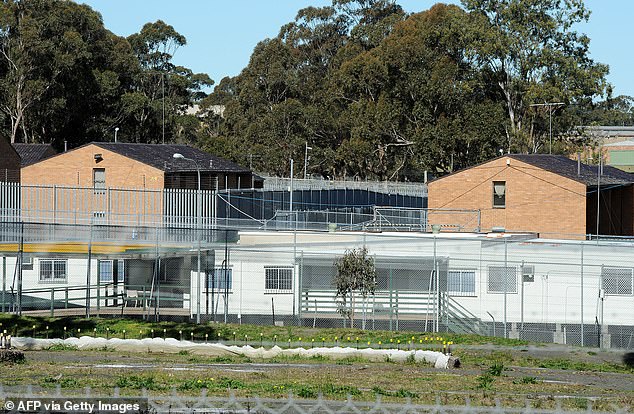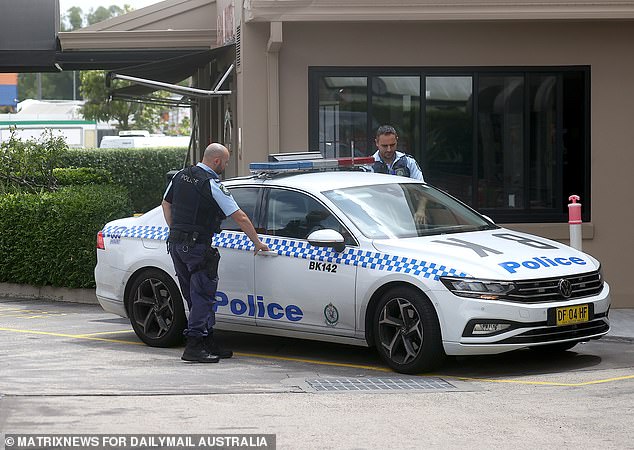Afghan refugee asked three boys for sex after being released from immigration detention
An Afghan refugee who repeatedly approached boys for sex after his release from immigration detention did not believe he had done anything wrong or committed a criminal offense.
The man, who was given the pseudonym FYBR, was imprisoned for his crimes against children, then returned to a detention center and could now return to the streets.
FYBR was on a list of serious offenders drawn up by the Home Office prior to the High Court ruling that indefinite immigration detention was unlawful.
The court ruling has released at least 111 inmates, including murderers, rapists and pedophiles, into the community, and FYBR is likely among them.
The Home Office has drawn up a list of serious offenders in immigration detention, ahead of the High Court ruling that freed at least 111 detainees. Police are pictured at a motel where asylum seekers have been released
It is known that other detainees on the same Home Office list, along with FYBR, have already been released, including a woman killer, a hit man and a child molester.
FYBR has spent seven years in detention – more than six years longer than he spent in prison – and there is no reasonable prospect of his deportation.
The 34-year-old is a registrable person under the Child Protection (Offenders) Act, speaks limited English and has no family or friends in this country.
Immigration Minister Andrew Giles declined to confirm FYBR had been released or discuss his current circumstances.
“The government does not comment on individual cases,” a government spokeswoman said.
FYBR, whose family moved from Afghanistan to Pakistan when he was three, arrived in Australia by boat in March 2013 and was detained as an illegal non-citizen.
He applied for a protection visa and was allowed to live in the community while that application was processed.
Shortly before noon on September 17, 2015, FYBR approached a 16-year-old boy wearing a high school uniform and asked him to come to his house for sex.
When the boy refused, FYBR, 26, told him to “kiss his ass,” according to court documents.
That afternoon, FYBR spoke with another 16-year-old boy about his personal life, including asking about his relationship status.
Earlier that month, FYBR had lured the same teen to his home after they talked about motorcycles, but the boy left when he got to the front door because he felt unsafe.
During their second meeting, FYBR asked the teen, who looked younger than 16 according to court documents, if he could find him a boyfriend and said he liked “sucking.”
The teen pushed FYBR away and told his mother about the incident.
Three days later, FYBR was sleeping under a tree when he woke up and saw a 14-year-old boy riding by on his scooter. FYBR was homeless at the time.
FYBR whistled at the boy and offered $100 if he kissed him, then asked the boy to “suck” him. When the boy refused, FYBR offered him $200.
The scared boy left, but was walking past FYBR later that day when the refugee grabbed his shirt. The police saw the boy fleeing and arrested him.
FYBR was arrested and his bridging visa revoked the same day he was taken into custody.
In March the following year, FYBR pleaded guilty in the local court to procuring a child for unlawful sexual activity, stalking/intimidation with intent to cause fear, and common assault.
FYBR had told police that he was attracted to younger men and that if the three boys he approached had accepted his sexual advances, he would have had intercourse with them.
A November 2018 Administrative Court of Appeal ruling found that FYBR’s attitude towards his crimes was relevant in assessing his risk of further offending.
“While admitting the offenses to police, FYBR told them he believed he had committed no offense and that he was within his rights to solicit sex from those young men,” the report said.
FYBR was sentenced to two years in prison but successfully appealed to the NSW District Court where he was jailed for one year with a minimum term of seven months.
Following the expiration of the non-parole period, FYBR was taken into immigration detention, where he has been held ever since.

FYBR served more than nine months in prison and was then transferred to immigration detention, where he spent the next seven years. The photo shows Villawood detention center in Sydney’s west
FYBR applied for a safe haven visa as he faced persecution due to his Hazara ethnicity and Shia Muslim religion, but was denied because he did not meet the character test.
The Administrative Appeals Tribunal again rejected FYBR when it attempted to overturn that decision.
“FYBR knows that what he did in Australia was unacceptable because of the consequences of his actions for him, but he does not understand why his actions were wrong,” it said.
‘He seemed to think his behavior was acceptable because he didn’t touch his victims.
‘The tribunal concludes from his evidence that at the material time he believed that the freedom available in Australia, compared to the restrictions on his conduct in Pakistan, enabled him to solicit minors to satisfy his sexual desires.’
The tribunal rejected FYBR’s claim that he was now aware of Australian law and spent every night reading a code of conduct provided to him while in detention.

The federal government passed emergency legislation last Thursday to tighten oversight and restrictions on released prisoners. Police are pictured at a Sydney motel where former prisoners are staying
‘The Tribunal accepts that the nature and seriousness of the offenses committed, the cumulative effect of FYBR’s conduct and the risk to the Australian community if he were to commit similar offenses in the future justify the exercise of the discretion to refuse to support visa granting’. said.
‘The Australian community expects non-citizens to obey Australian laws. He has been convicted of serious offences, a sexual offense and three other offenses against vulnerable members of the community.”
The federal government passed emergency legislation last Thursday to tighten oversight and restrictions on released prisoners.
One of the requirements is that they wear ankle monitoring bracelets.
The non-citizens were released after the Supreme Court found there There was little to no prospect of them being deported because they were stateless or because no third country would accept them for resettlement.
Shadow Immigration and Citizenship Minister Dan Tehan called on Home Secretary Clare O’Neil to reveal how many detainees had been released and how many had been fitted with ankle bracelets so far.
“The Australian people deserve to know the details of the hardened criminals being released into the community and they deserve to know what the government is doing to keep them safe,” Tehan told Ny Breaking Australia.
“The public deserves to know how many criminals released from immigration detention are in the community unsupervised and they deserve to know whether Immigration Minister Andrew Giles has used his powers to waive the requirement for ankle bracelets.
“The more Australians find out about Labor’s handling of this issue, the more concerned they become.”
The government spokeswoman said security measures have been put in place to ensure the safety of the community.
“Individuals released as a result of the Supreme Court’s decision have been granted bridging visas with appropriate conditions, and law enforcement authorities have been notified of their release,” she said.
“The implementation and rollout of electronic surveillance equipment continues and activities are ongoing this week.”
